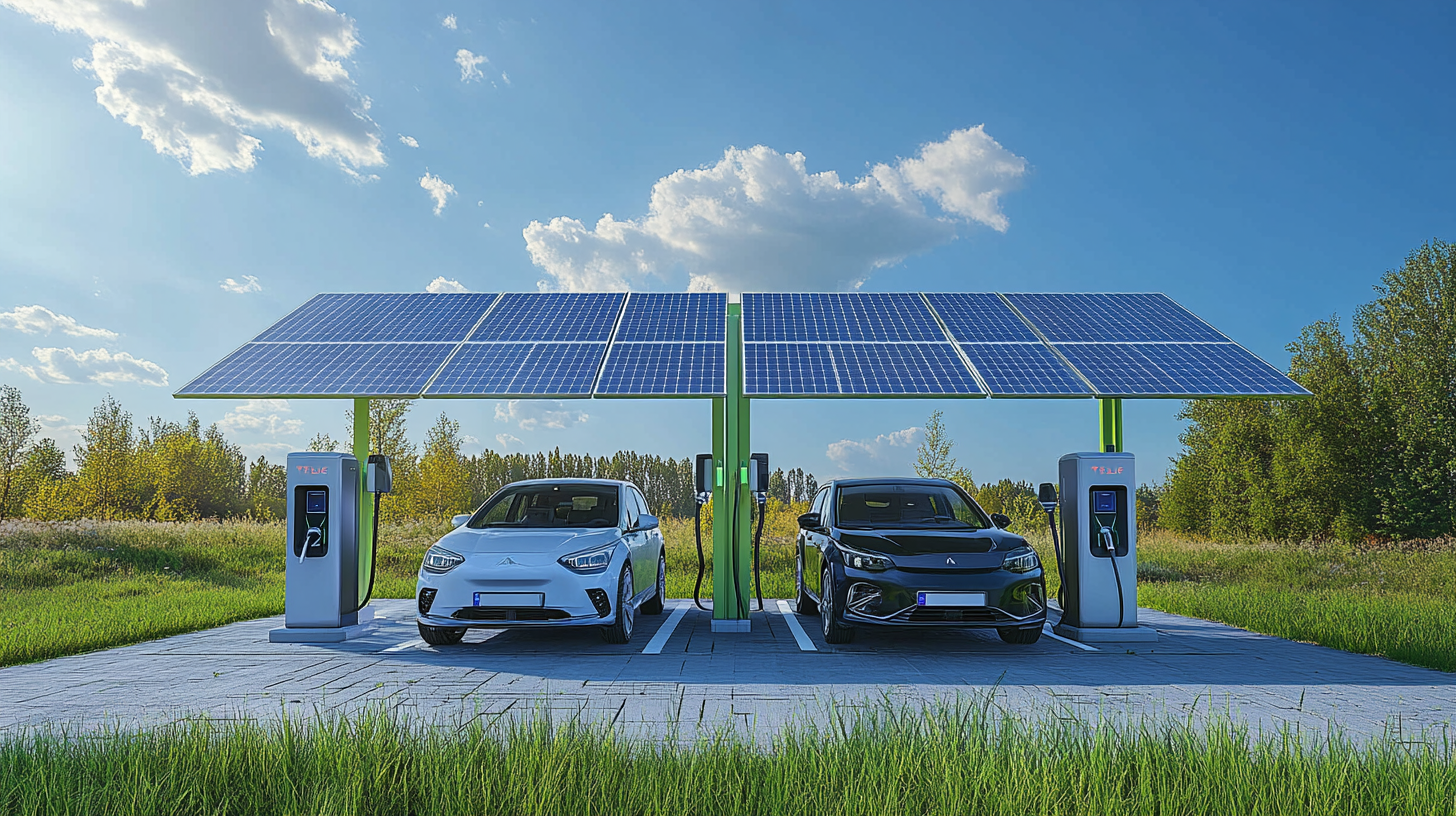The transition to green transportation is more critical than ever, as cities around the world grapple with rising carbon emissions and air pollution. According to a report by the International Energy Agency (IEA), electric vehicles (EVs) are projected to account for 30% of global car sales by 2030. This shift not only highlights the growing adoption of EVs but also emphasizes the urgent need for sustainable infrastructure to support them. Solar powered EV charging stations present a promising solution to these challenges, harnessing renewable energy to minimize the environmental impact associated with traditional charging systems.
The synergy between solar energy and electric vehicles aligns with the commitments made under the Paris Agreement to reduce greenhouse gas emissions. A study by the National Renewable Energy Laboratory (NREL) indicates that if the U.S. installed solar powered EV charging stations nationwide, it could significantly reduce reliance on fossil fuels, leading to an estimated annual carbon dioxide reduction of over 100 million metric tons by 2030. By unlocking the potential of solar powered EV charging solutions, we can pave the way for a more sustainable transportation future, ensuring that the growing number of electric vehicles operates on clean, renewable energy.

As the electric vehicle (EV) market continues to surge in popularity across the U.S., driven by a growing awareness of environmental issues and advancing technology, solar energy is stepping into the spotlight as a game-changing solution for sustainable transportation. The increasing demand for EVs is not just about getting from point A to point B; it's also about the broader environmental implications of vehicle emissions. Consumers are now more discerning about the sources of energy that power their vehicles, making solar-powered charging stations an appealing option. The rise of solar energy within the EV market aligns perfectly with ongoing innovations in battery technology, particularly in the realm of cell-to-pack solutions. These advancements promise enhanced efficiency and longevity for batteries, allowing for quicker charging times and improved performance of electric vehicles when paired with solar energy sources. As renewable energy becomes more accessible and integrated into our daily lives, solar-powered charging solutions are set to revolutionize not just how we charge our vehicles, but also how we think about energy consumption in general. Furthermore, the growing infrastructure surrounding solar charging points is paving the way for a future where driving an electric vehicle is synonymous with eco-friendliness. The combination of solar energy and electric mobility presents a compelling case for consumers as they seek greener alternatives in an age where sustainability is becoming a crucial consideration. This shift reflects a collective move toward a future where clean energy and sustainable practices fuel not only our daily commutes but the broader framework of transportation as a whole.

As the world shifts towards more sustainable practices, innovative solar charging technologies are paving the way for a revolution in the transportation sector. The integration of solar power into electric vehicle (EV) charging infrastructure offers a promising solution to reduce carbon footprints and lessen our dependence on fossil fuels. Thanks to advancements in photovoltaic technologies, solar panels are now more efficient and aesthetically designed, making them not just functional but also visually appealing when installed in public spaces or residential areas.
One of the most exciting developments in this field is the emergence of solar canopies and charging stations designed specifically for electric vehicles. These structures harness sunlight to power charging points, ensuring that EVs can continuously charge without drawing from the grid. This is particularly beneficial in urban environments where space is at a premium; solar canopies can provide necessary cover for parked vehicles while simultaneously acting as a reliable energy source. Many companies are now investing in such technologies, leading to widespread installation and creating a network of green charging solutions.
Moreover, advancements in battery storage systems complement solar charging technologies. By efficiently storing excess solar energy for use during peak hours or cloudy days, we can maintain a stable power supply for electric vehicles. This combination not only enhances the viability of solar charging stations but also promotes energy independence, allowing regions and communities to benefit from localized energy generation. As we continue to innovate and embrace these sustainable practices, solar-powered electric vehicle charging solutions are set to transform the future of green transportation, aligning perfectly with global sustainability goals.

The integration of solar-powered electric vehicle (EV) charging solutions is becoming increasingly critical in addressing climate change and reducing our carbon footprint. As cities like New York embark on ambitious carbon neutrality goals, the need for innovative technologies that optimize energy consumption is more pressing than ever. By incorporating solar photovoltaic (PV) systems into EV charging infrastructures, cities can leverage renewable energy to significantly mitigate greenhouse gas emissions while meeting the rising demands for electric transportation.
Recent developments in the sector demonstrate the viability of combining solar energy with battery energy storage to enhance the efficiency of charging stations. This integration not only ensures a consistent energy supply, even during periods of low sunlight, but also accommodates the unpredictable nature of solar generation. Consequently, electric vehicles can be charged using clean energy, which drastically reduces the carbon emissions typically associated with fossil fuel-powered transportation.
Furthermore, as initiatives across the globe prioritize renewable energy sources, the use of solar energy for EV charging is gaining traction. From New Zealand’s strategic policies aimed at achieving carbon neutrality by 2050 to various projects worldwide integrating solar arrays into urban infrastructure, the benefits of solar-powered EV charging solutions are becoming increasingly recognized. These advancements not only promote sustainability but also encourage a shift toward green transportation, ultimately leading to a cleaner, healthier planet for future generations.

As the world increasingly shifts towards sustainable energy, integrating solar solutions with electric vehicle (EV) infrastructure presents significant economic benefits. According to a report by the International Energy Agency (IEA), the number of electric vehicles is projected to exceed 300 million by 2030, representing a crucial opportunity to rethink charging infrastructure. By incorporating solar-powered charging stations, the upfront investment can be offset by the long-term savings on electricity costs, which are expected to decrease as solar technology advances and becomes more affordable.
The National Renewable Energy Laboratory (NREL) estimates that EV owners can save around $1,200 annually by utilizing solar energy to charge their vehicles instead of relying solely on grid energy. This is particularly relevant as the cost of solar installations has plummeted by over 70% in the last decade, making it an attractive option for both public and private charging facilities. Additionally, solar-powered charging reduces dependence on fossil fuels, contributing to a more stable and predictable energy cost environment for EV operators.
Furthermore, as municipalities and businesses invest in solar-integrated EV infrastructure, they can capitalize on potential tax incentives and rebates aimed at promoting renewable energy adoption. The U.S. government has set a target to have at least 500,000 public EV chargers nationwide by 2030, which presents a lucrative market for solar-driven solutions. By embracing solar-powered charging stations, stakeholders can not only enhance their sustainable practices but also reap economic rewards in an ever-evolving transportation landscape, fostering a greener future for all.
As urban centers continue to grapple with the repercussions of climate change and growing population density, the push towards sustainable mobility has never been more critical. Solar energy stands out as a pivotal element in shaping the future of transportation, particularly through innovative electric vehicle (EV) charging solutions. According to a recent report by the International Energy Agency (IEA), the number of electric vehicles on the road could surpass 300 million by 2030, emphasizing the urgent need for sustainable charging infrastructure.
Solar-powered charging stations offer a symbiotic solution that not only addresses the rising demand for EV charging but also contributes to a greener energy landscape. A study from the Solar Energy Industries Association (SEIA) highlights that integrating solar panels into charging stations can significantly reduce greenhouse gas emissions, with the potential to eliminate over 1 million metric tons of CO2 annually if deployed at scale. This aligns with the growing trend towards decentralizing energy production—where charging stations can harness renewable energy, thereby reducing reliance on fossil fuels.
Moreover, the economic implications are substantial. As highlighted in a report by BloombergNEF, the cost of solar energy has plummeted over 80% since 2010, making it increasingly feasible for municipalities and private companies to invest in solar charging solutions. This approach not only drives down operational costs for energy-intensive charging stations but also paves the way for a reimagined public transport sector that harnesses solar energy, suggesting a robust synergy between technological advancement and environmental stewardship within the realm of sustainable mobility.
